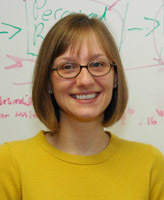
Trouble with algebra? Notre Dame Psychologist Nicole McNeil’s research shows that basic math may be to blame.
Published in a recent issue of the Journal of Cognition and Development, the study by McNeil and her colleagues suggests that even though adults tend to think in more advanced ways than children do, those advanced ways of thinking don’t always override old, incorrect ways of thinking—especially in the domain of mathematics.
The study examined how practice with basic addition facts affects performance on more advanced math problems. Undergraduate students were randomly assigned to practice addition facts (e.g., 8 + 6) or to complete one of several control tasks. Then, students solved pre-algebra equations and algebra word problems. Results showed that the practice with addition hurt performance on the pre-algebra and algebra problems.
“It is widely assumed that practice with basic facts helps higher-level problem solving. If students can recall basic facts easily, then their minds should be ‘free’ to focus on more advanced concepts,” McNeil says.
“However, our research has shown that the effects of arithmetic practice are not as straightforward as this traditional view suggests, because arithmetic practice can lead students to activate a way of thinking about math that interferes with understanding of algebra.”
When striking performance deficits like these occur, it provides a window into the content and organization of knowledge. These less advanced strategies used by college students could provide clues into the nature of learning and cognitive development.
“In our previous research we have found that children in the U.S. develop an operational view of equations in which they assume that the equal sign comes at the end of equations—and that the equal sign signals to ‘add up the numbers.’ This view leads children to use incorrect strategies on pre-algebra problems,” explains McNeil. “Interestingly, the undergraduates in our study who practiced addition started using the same incorrect strategies that children typically use on pre-algebra problems. This tells us that the incorrect, operational ways of thinking about arithmetic that children develop back in elementary school are not revised or abandoned, even after years of experience with algebra.”
So should we stop children from practicing arithmetic?
“Obviously, it would be silly to condemn arithmetic practice outright,” McNeil says. “Instead, our results add support to recent calls for more varied, richer exposure to a variety of problem types from the beginning of formal schooling. If children can practice 3 + 4 = __, then why not also __ = 3 + 4?”
McNeil suggests that practicing arithmetic facts in a variety of formats is a simple change that can be embraced by traditionalists and reformers alike, and would facilitate broader knowledge representations from the start, while still allowing students to gain proficiency with the basic facts.
Learn More >
- Department of Psychology
- Nicole McNeil faculty page
- Continuity in Representation Between Children and Adults: Arithmetic Knowledge Hinders Undergraduates’ Algebraic Problem Solving
- Journal of Cognition and Development
Originally published at newsinfo.nd.edu.


